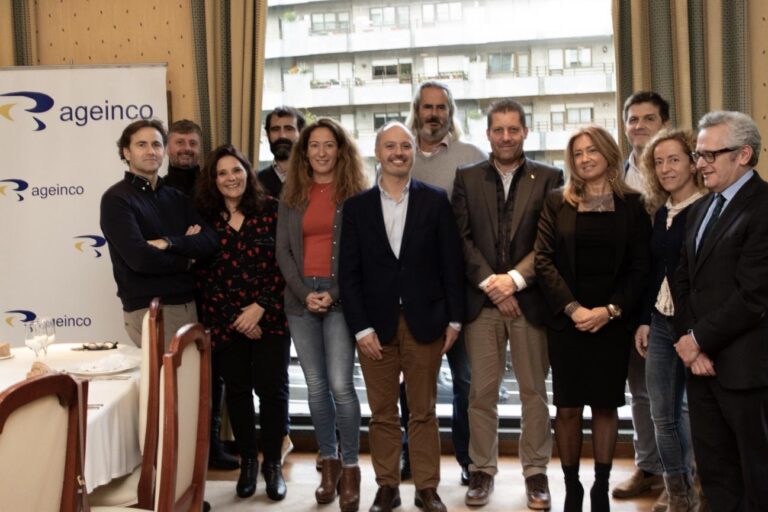NOVEMBER 22, 2019
The Delegate of the Free Zone of Vigo, David Regades, has been the guest of the last stand of AGEINCO (Galician Association of Engineering, Consulting and Technological Services Companies), celebrated today in the Circle of Entrepreneurs of Vigo. In a lunch format, David Regades met with a representation of companies of the association, headed by its president Daniel Prieto Renda. The meeting served so that AGEINCO knew first-hand, through its delegate, the position of Free Zone of Vigo on different issues that the association considers key in the development and future of the engineering and technology consulting sector in Galicia.
The creation of the Galician Engineering Cluster, whose process is currently AGEINCO and whose importance is capital in the association’s agenda, was the first major issue to be put on the table. Daniel Prieto highlighted the importance of agglutinating an increasingly “multidisciplinary” sector and projected a message of union that allows the integration of the multiple actors involved in the industry. “We want to be told that they want to be here because things are done well,” he said in reference to AGEINCO, the body that is leading the creation of the Cluster. For his part, David Regades showed his optimism about it: “I congratulate you on this step forward, it is very positive for the sector,” he said, and confirmed the need to create lines of action that integrate different professional profiles: “The projects are every More ambitious In Zona Franca we are demanding multidisciplinary teams for projects, from sociologists to landscape designers, ”he added.
Public contracts
The need to unify criteria around an area as broad and complex as that of the contracting processes by public administrations was another of the major issues discussed at the rostrum. Both parties, AGEINCO and Zona Franca, agreed on the positive nature of the new Public Sector Contract Law that entered into force in 2017 and which states that 49% of the projects under engineering and architecture competition must be assessed from the perspective of intellectual services.
Daniel Prieto was clear about it: “We believe in a country that develops based on talent.” A statement that perfectly illustrates the demand of the sector so that public contracts prioritize the quality of the project over the price. David Regades agreed in this reading and consolidated the idea that, with a new law, qualitative assessments over budgetary ones prevail in the criteria. “Not as before,” he said. And he wanted to give as an example the Free Zone of Vigo, where the management always contemplates that the quality of the proposal be imposed. “You have to be more ambitious in your claims,” he added in clear understanding of AGEINCO’s claims, to point out after that, sometimes, part of the responsibility for the price drops are those of the companies themselves, who make reckless leave when they meet the formulation of the specifications or because they justify them for the industrial benefit. “In downward projects we all had a bad time,” he said.
Optimism about an uncertain future
Before the direct interpellation of Daniel Prieto to make an assessment of the medium and long-term macroeconomic effects on the region, David Regades wanted to send a message of optimism. From Zona Franca, projects and structures are developed that will enable the different industrial sectors that in Galicia in general, and in Vigo in particular, to have their trajectory and projection.
The automobile industry is one of the dynamic sector paradigms at the local level. In a market that is undergoing a worldwide transformation, automobile production in Vigo continues to grow while in other places it falls, thanks above all to the historical development of vehicles for industrial and commercial use. Daniel Prieto revealed a reality that creates uncertainty: “A new mobility model is being generated and we have to be prepared for the possibility of the automobile undergoing drastic changes,” he said.
David Regades was no stranger to this reality and admitted a paradigm shift: “Indeed, you can’t talk about automotive, you have to talk about mobility,” he said, and cited a real estate development in Barcelona aimed at millennials in which he is not planned to integrate garages, exemplifying that change of model towards which society seems to be heading. Given this context, David Regades highlighted, in a local key, the importance of the automobile industry and its parallel activities. “From Zona Franca we are committed to projects that strengthen the sector while contemplating the changes that are going through, promoting projects such as the World Car Center, the High Speed Circuit or the car battery factory.
Regarding the participation of the Free Zone in innovation and entrepreneurship projects, David Regades was in favor of the administration being part of the capitals, so that benefits are shared and not only losses: “If we win, we win all; and if we lose, we lose all. ”




